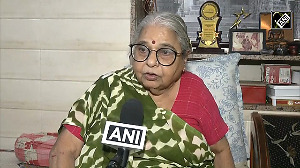How many Indians would recognise the name 'M C Chagla'? Mumbaikars might have a hazy recollection of seeing an 'M C Chagla Street' as they pass through Vile Parle in northwest Mumbai but that would be about it. Just to refresh everyone's memory, Chagla was one of Jinnah's closest associates in the 1920s, being both his private secretary and Secretary of the Muslim League.
In 1928, the Congress asked Motilal Nehru to write a draft Constitution for India as a riposte to the Simon Commission Report. The Nehru Report spoke in terms of a secular India, a vision that was rejected by Jinnah. A disillusioned Chagla then left Jinnah for good. After Independence, Chagla would go on to become chief justice of the Bombay high court and then Union education minister.
It was while he was serving in that last post that Chagla was asked how he envisioned his job. It was, he said, his intention to educate a generation of Indians who would not be surprised when they saw a Hindu as vice-chancellor of Aligarh Muslim University while his counterpart at Banaras Hindu University was a Muslim. The poor man probably never envisioned the day when someone like Arjun Singh would be sitting in the same chair.
The Union HRD minister in his infinite wisdom has decided that the best way to preserve Aligarh Muslim University's minority status is by reserving 50% of the seats for Muslims. The decision seems to have been taken unilaterally, without consulting anyone else in the Cabinet. His fellow ministers have been notably silent, and the Left Front, which supports the ministry from outside, has openly opposed the move. There is a general belief that the move was taken by Arjun Singh in a bid to woo Muslim votes for the Congress.
Interestingly enough, there is a large segment of Muslims, not least within Aligarh Muslim University itself, who dislike the blatant prejudice. They point out that Muslims have always constituted the vast majority of both its staff and its student body. The problem, if any, is that the university has been gradually losing its status as a pan-Indian institution. How many students, Muslims or otherwise, come to Aligarh from the South or the East? And what has the university done in recent decades to upgrade its academic standards to a level where it could compete with, say, the University of Delhi?
Aligarh Muslim University today is controlled by a handful of powerful families who live in and around Aligarh. Under their dominion, whether well-meant or not, the institution has been reduced to drawing on students from Uttar Pradesh and, perhaps, Bihar to the exclusion of other states. Reserving 50% of the seats for students from outside Uttar Pradesh might have made a certain amount of sense, even if all of them happened to be Muslim. But Arjun Singh's silly decision stands as the epitome of empty gestures.
Restoring the pan-Indian character of Aligarh Muslim University should be a matter of concern for all Indians, not just Muslims. As regular readers know, my home state is Kerala, a state renowned for its dedication to education. Yet Muslims are a step behind their Hindu and Christian neighbours even here. If Muslims cannot be motivated to match their fellow Keralites, how much hope do you hold for their doing so in the likes of Uttar Pradesh and Bihar?
I hope nobody is going to dispute the necessity -- not just the desirability, but the absolute need - of education in this age. How do we expect to see India progress if slightly over 10% of its population is perpetually slipping behind as far as higher education is concerned?
This is where Aligarh Muslim University could have played such a vital part. Ideally, it would have served as a beacon, a place that all Muslims would aspire to join because it was recognised as one of the best of its kind in India. Sadly, in the past three decades or so, Aligarh Muslim University has lost its vision. Talk to Muslims in South India, and they speak, rather wearily, of Aligarh Muslim University being some kind of a ghetto. The more ambitious among them admit frankly that they won't even bother to apply to Aligarh.
Arjun Singh has been a disaster in the HRD ministry. With his latest decision he has not helped Aligarh Muslim University as much as he has lent respectability to competitive minority politics. We know that elections to the Bihar assembly are due no later than November. The political situation in neighbouring Uttar Pradesh is so fluid that nobody knows when the polls might become necessary. That, of course, is why Arjun Singh cynically made his empty gesture of reservation, without thinking of the larger consequences.
This is a Union Cabinet where the principle of collective
responsibility has been all but forgotten. Each Cabinet minister treats his department as his own fiefdom without bothering to consult his colleagues, probably not even the prime minister. This leads to a plethora of ill-thought-out decisions. Some of them are merely silly, such as the health minister's ruling that smoking cannot be portrayed in films. (Will he ask the censors to go through all the films produced in the past and cut out the offending parts?) Other unilateral pronouncements are not just stupid, but potentially dangerous.
We have already seen how embarrassed the prime minister was when his railway minister chose to attack the Election Commission. His silence over Arjun Singh's cynical manoeuvre is equally telling. But it is not enough to keep silent, Mr Prime Minister, good men are expected to act when they see something that is wrong.
The HRD minister has devised a solution that nobody wanted for a problem that many did not see. Mr Prime Minister, what will you do to save the further degradation of the once-proud Aligarh Muslim University?





